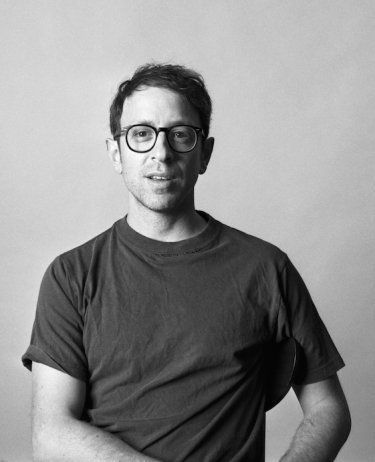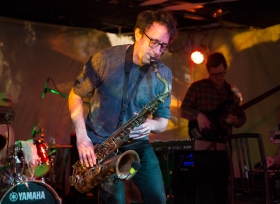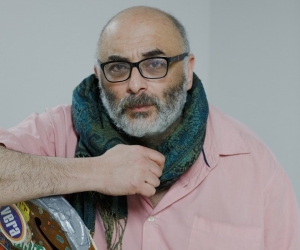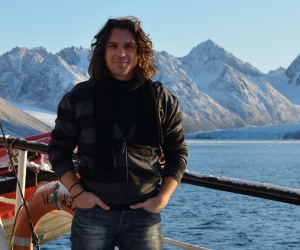When we listen to music, are we meant to enter the hearts and minds of those who’ve created it? Or is listening more of an interior experience—of turning inwards and creating space to experience our own feelings? For Joseph Shabason, the answer to both questions is yes.
The Toronto-based saxophone player and new-jazz composer has spent much of his career playing in bombastic settings—grounding the songs of Toronto art-pop band DIANA, and wailing on solos with esteemed acts like Destroyer and The War on Drugs. But Shabason’s own music takes a more introspective turn.
With his 2017 debut solo album, Aytche, Shabason revealed himself to be less interested in soloing than in tone and mood. He’s a musical omnivore: throughout our conversation he mentions inspirations ranging from avant-garde composer Jon Hassell to Toronto prog weirdos Bart. And while saxophone may be his primary instrument, his compositions sideline that instrument’s melodic potential in favour of exploring its texture: Shabason’s playing is breathy and delicate, somehow sounding more like the journey his breath takes through the metal of a horn, rather than simply a sequence of notes.
On his second album, Anne, released in fall 2018 on the Western Vinyl imprint, Shabason digs deeper into this sound, incorporating its more synthetic textures and teasing out its natural edges. Anne is named after Shabason’s mother and is inspired by his experience caring for her as she lives with Parkinson’s disease—and is therefore much more than just an exercise in texture. Woven through Anne’s nine tracks are excerpts of a conversation between Shabason and his mother that is the emotional and tonal centre of the record. Across the album, Anne speaks about her experience of degenerative illness and of coming to terms with not being the person you hoped you might someday be. When Anne says, “I think I can kick the habit of wanting to be perfect,” amid the minor-key shuffle of synthesizers on “Deep Dark Divide,” it’s hard not to hear her son’s struggles too. How do you find a way of healing that isn’t simply a linear path to health? Shabason asks. How do you make music about imperfection?
“When I spoke to my mother, it felt like it was a singular statement,” he explains. “When you’re using those types of interviews there’s a possibility that it can get pretty . . . corny is the wrong word, because I don’t want to ever say that a personal thing for somebody is corny, but it could get a bit like beating people over their heads with it: melodramatic. So I had to choose my moments.”
Shabason will wind himself into a thought, digging deeper into the corners of his brain before finding a way to laugh his way out of it. His tendency to find a moment of levity belies what feels like a deep well of a mind—all jokes aside, he’s clearly thought a lot about both Anne’s sound and its emotional through-line. For Shabason, who’s recently taken an interest in New Age music, sound offers a place to strip away pretence and get a little closer to feelings as they bring themselves into the world. He’s less interested in projecting a feeling than creating space for one to emerge; Anne is music for healing and unravelling, he says, not necessarily for feeling good.
“I think acknowledgement is a good word for it,” he says. “You’re not going to make somebody better, you’re not going to feel better about them feeling bad—these things get worse and worse and worse. But if you can kind of acknowledge the situation in any way that feels healthy to you, there’s at least peace in that.”
For much of its duration, Anne feels like exactly that acknowledgement of the difficulties of degenerative illness; its sound is tense and dissonant, anchored in tonal shifts that offer forward momentum, but little in the way of cadence or resolution. But its last song, “Treat It Like A Wine Bar,” feels somehow more hopeful. The track is the closest that Shabason gets to peace: across a bed of synthesizers, quiet melodies dissolve a sense of linear time—has it been five minutes? Ten?—and foreground a deep sense of calm. As Shabason puts it, “you’re not worried about what’s happening next, You’re not waiting for the next big section or whatever. You can kind of just sit and learn to just be content in the stillness of it. I think that’s a beautiful thing.”
At the song’s end a flute trills slowly up and down but fades out on its way up—waiting for an exhalation, for one more breath that never comes.
AUDIO: Dangerous Chemicals, from the album Anne (Western Vinyl, WV182)
Top photo by Colin Medley. Bottom photo by Jennifer Hyc.




